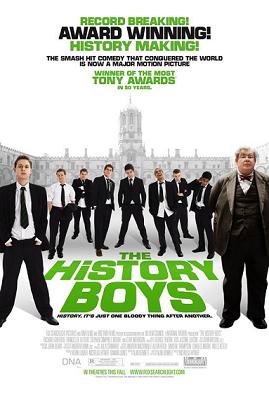
Main Page
Interviews Menu
Alphabetical Menu
Chronological Menu


Review of The History Boys Nicholas Hytner directs The History Boys about a group of prep school student, with the assistance of two teachers, Hector (Griffiths) and Irwin (Moore), who strive to get accepted into Cambridge or Oxford University. Hytner has directed films such as Center Stage, The Object of My Affection, The Crucible and The Madness of King George. He also directed plays such as Miss Saigon and The History Boys. I had the privalege to interview him. Fox Searchlight Pictures will release The History Boys on November 21st, 2006. NYC MOVIE GURU: Why did you decide to turn the play into a movie? NH: It was a genuine sense that there was something to be gained—a real difference in the way we can look at the material. The cheap impulse was the get closer to these [characters] because that, of course, is the thing you can’t do in the theater. The theater operates in permanent wide shot and from a fixed point of view. One of the things you have to do when you direct a play, particularly a play with a lot of [actors] on stage, is to try and manipulate any audience’s [perspective]. Ultimately, that choice is up to the audience—a much more democratic experience. The purpose of making this film was to see what happens when you actually got a camera in there among them, moving with them, following their speed of thought and getting to know them very very well. I can’t deny that it was also a wonderful opportunity to catch these 12 actors doing this material forever. NYC MOVIE GURU: How do the settings of the play and those of the movie differ? NH: By in large, it stays in the same world that the play stays in, much more than The Madness of King George did. The world of these characters is the schoolroom which is why a huge part of the film stays in the closed world of the school. That was a very deliberate decision. Let’s not try to open it out that much. It doesn’t need it. It doesn’t cry out for it. It’s a film about going inside these people—getting behind their eyes and under their skin—much more than it is a film about a wider world than the school. If you saw the play, we did have glances at the world outside the school in video interviews. NYC MOVIE GURU: What scenes did you exclude from the movie that were in the play? NH: The big thing that we cut from the play was the whole element of Irwin’s future career—the flash-forward scenes. It was the biggest and least painful cut we could make. Without those scenes [and] without seeing him in a wheelchair right at the beginning of the play and again in the second half, [we thought] it would have felt gratuitous. He ends up in a wheelchair in the play as an answer to a mystery. [In the film] it would have felt completely out-of-the-blue. NYC MOVIE GURU: How did the character of Irwin (Stephen Campbell Moore) differ between the play and the movie? NH: You met him in the play, right at the beginning and he’s already a political spin-doctor, applying the same methods to politics as he has applied to history. You see him like that [and] you’re suspicious of him right through the play. The advantage of the film is that you discover him at the same speed that the boys discover him and he’s a much more vulnerable and sympathetic character. I think that that is a gain—I hope so. NYC MOVIE GURU: How did Samuel Barnett come on board? NH: I’m always looking for the best of the drama school leaders. The first time I met [Samuel Barnett], I did a play called “Mother Clapp's Molly House” by Mark Ravenhill which he developed with students at Lamda. As part of the casting process for that, I met all [of] the students who had been part of the development process for Mark and actually took very few of them, but I remember meeting [Samuel Barnett] at that point and thinking how good he was. Then, [I] went to see a show at Lamda that he was in, “On the Town”, so I knew he sang. He claims nobody knew he sang, [though]. So, I’ve been looking to bring [him] into The Nation [Theater] for a while. The first time I knew him, he was in “Mother Clapp’s Molly House”—by in large, in a dress. NYC MOVIE GURU: What was the most difficult aspect of directing The History Boys? NH: The most difficult thing for me is that I’m just not in my comfort zone, so thinking through a camera doesn’t come as second nature to me. Main Page Interviews Menu Alphabetical Menu Chronological Menu ______________________________________________________ |
The NYC Movie Guru
themovieguru101@yahoo.com
Privacy Policy